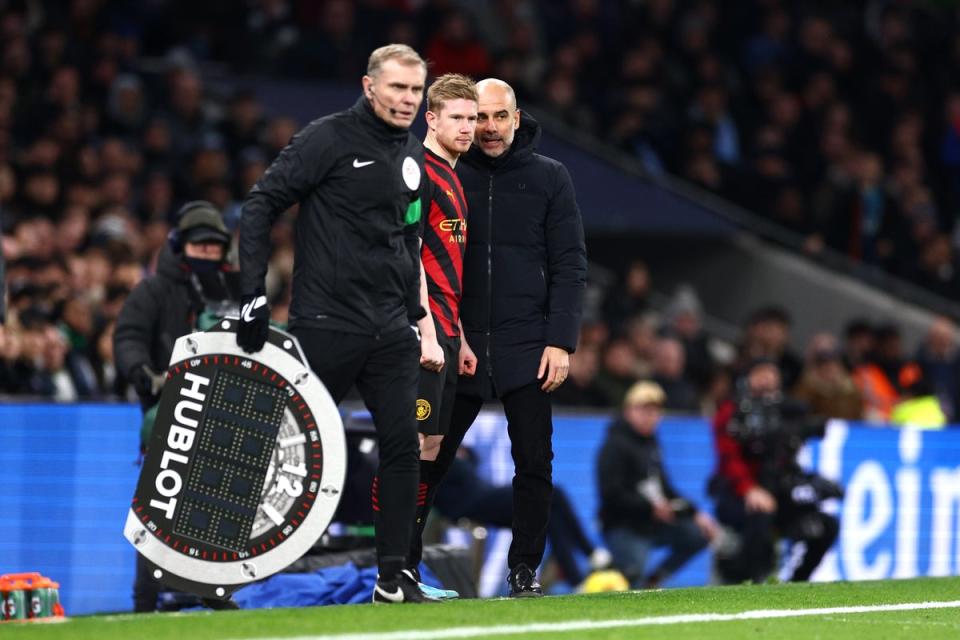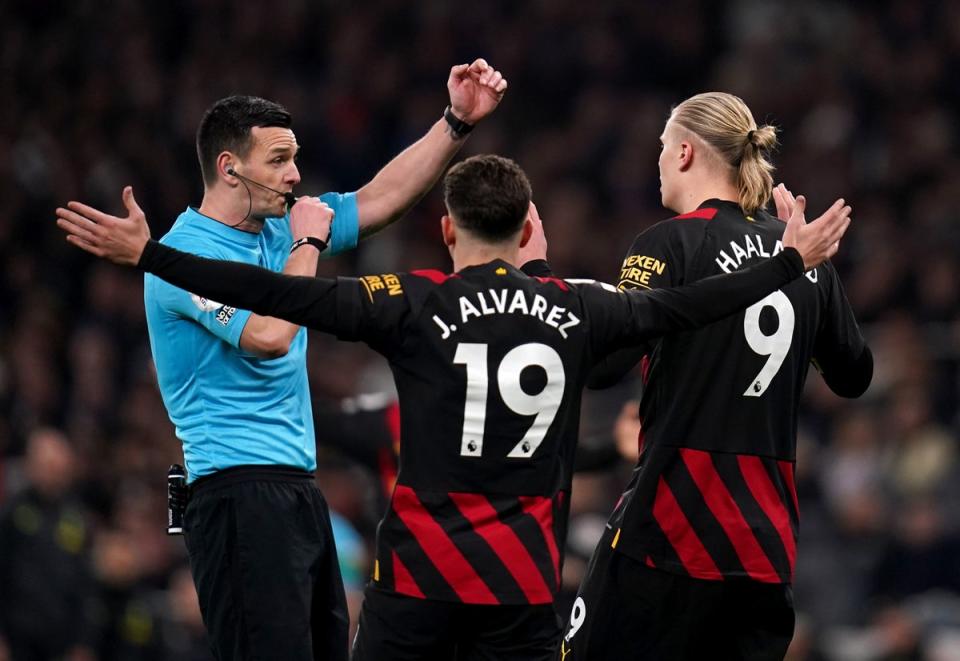Kevin De Bruyne faces Pep’s displeasure but it’s Man City who pay the price
One of the two most creative passers on Manchester City’s books was in the starting 11. He had an assist after 14 minutes. Not for City, admittedly. Joao Cancelo was in the Bayern Munich team. The beneficiary of his supply line was not Erling Haaland but Kingsley Coman. He was facing Wolfsburg and a former Wolfsburg playmaker, Kevin De Bruyne, became the latest public target of Pep Guardiola’s displeasure. There was no pretence of a minor injury. His demotion was tactical. “Definitely,” said Guardiola. was
There are different forms of exile, to the Bundesliga and the bench. One will last for five months. The other spanned 58 minutes. It offered scant evidence City are better off without the player with the most assists in the Premier League this season and the fifth most in its history. It did demonstrate the restlessness of Guardiola, the fractiousness with some of his players that has extended beyond Cancelo’s dramatic fall from grace. But without the creators, City weren’t creative enough.
As City suffered their annual defeat at the Tottenham Hotspur Stadium, the result was the same, the details different. Guardiola’s team lost and didn’t score: for once, neither did Son Heung-Min. But if Tottenham were depleted by the loss of their manager, with Antonio Conte watching on from home after keyhole surgery to remove his gallbladder, City felt weakened by choice.

Rewind a week and there was a case for arguing their strongest side at Tottenham would have featured De Bruyne, Cancelo, Ilkay Gundogan and Ruben Dias. The eventual side included none. As Riyad Mahrez had tormented Tottenham in a second-half comeback 17 days earlier, the logical expectation might be that the Algerian, having already struck the bar, would retain a pivotal part in Guardiola’s plans. Instead, he was sacrificed when De Bruyne was summoned.
If Guardiola continues to confound, overthinking has led to underachievement of late. The City manager has lost to Cristian Stellini and Nathan Jones in a few weeks. It may forever remain a unique double, albeit not one to cherish. Tottenham’s lugubrious-looking assistant had picked the team, chosen not to include new signing Pedro Porro, and ought to congratulate himself on his sure touch. There were no shocks in his team selection, just in the result: Tottenham, without a win against big-seven opponents this season, finally proved their big-match pedigree.
Guardiola, meanwhile, experimented by doing something that was once the epitome of orthodoxy. On a weekend when Sean Dyche did not play 4-4-2, he did. It was in part a reflection of his attempts to cram Julian Alvarez into the team: the replacement for perhaps the world’s best midfielder was a World Cup-winning striker. It also highlighted a bespoke gameplan: Alvarez has made five Premier League starts and two have come against Tottenham. He had scored in the first but there was no repeat of City’s four-goal second half then.

Alvarez nevertheless at least offered the promise of an equaliser. Haaland did not: eight City players had a shot, Kyle Walker and Manuel Akanji among them, but not the Norwegian. For almost an hour, he was lacking his supplier in chief: De Bruyne has set up five of his goals. Belatedly appearing, the Belgian offered urgency while extending a personal drought to 12 games. Yet it was only logical that his goals would become more infrequent after Haaland’s arrival. Instead, he was part of a midfield that became stretched as City sought an equaliser and Tottenham threatened to catch them on the break; whoever the manager, it has been a profitable formula for Spurs against Guardiola.
Dropping De Bruyne could be framed as an attempt to do something different to halt that losing run, but he has only actually only started on two of those five trips to Tottenham. He is well acquainted with the plush seats in their dugouts.
And in his absence, and while Haaland was anonymous, the game was decided by a midfielder Guardiola encouraged at Bayern and a player who can be both scorer and creator: the irrepressible Pierre-Emile Hojbjerg set up Harry Kane’s record 267th goal for Tottenham. Guardiola had called Kane one of the best strikers he saw in his life; now he has overhauled one of the finest he was too young to see.
Jimmy Greaves’ final Division 1 game came when Guardiola was three months old, the last of his 266 Tottenham goals the year before. His record had gone unchallenged for half a century. Greaves was the byword for goals, the quicksilver predator. With his low centre of gravity and seamless acceleration, the way he glided past defenders made him look like the Sergio Aguero of the Sixties.
Kane was never as slick, but it is a colossal feat for a self-made player. Greaves was a teenage phenomenon. Kane was not. Instead, he was the great improver, the forward who polished his talent until he shone. It is 18 months since Guardiola tried to sign him, five years since he branded Tottenham “the Harry Kane team”. It is truer now than it was then. Manchester City have often been the Kevin De Bruyne team. Not when he isn’t on the pitch, though.

 Yahoo Sports
Yahoo Sports 